An Unexpected Stop during Sols 3580-3581
Thursday, 01 September 2022 19:08 We kicked off Curiosity operations this morning with the news that our previous drive did not complete as planned. Some of the sand in the area caused the rover to veer ever-so-slightly off course, which then caused the right side of the vehicle to just clip the edge of a large rock.
When the onboard safety check sensed the wheels were climbing a feature larger than anticipated, Curiosity
We kicked off Curiosity operations this morning with the news that our previous drive did not complete as planned. Some of the sand in the area caused the rover to veer ever-so-slightly off course, which then caused the right side of the vehicle to just clip the edge of a large rock.
When the onboard safety check sensed the wheels were climbing a feature larger than anticipated, Curiosity A Whole New World - Sols 3578-3579
Thursday, 01 September 2022 19:08 After a successful 13 meter weekend drive, Curiosity finds itself in the middle of "Marker Band" valley. The underlaying bedrock has changed dramatically over the last week, from dark and nodular to light-toned and relatively smooth. This area has been of interest to the science team since Gale crater was first selected as the landing site, 10 years in the making!
The orbital mineralogical
After a successful 13 meter weekend drive, Curiosity finds itself in the middle of "Marker Band" valley. The underlaying bedrock has changed dramatically over the last week, from dark and nodular to light-toned and relatively smooth. This area has been of interest to the science team since Gale crater was first selected as the landing site, 10 years in the making!
The orbital mineralogical Chang'e-5 reveals an intermediate stage in space weathering process of lunar soils
Thursday, 01 September 2022 19:08 This study is conducted by a joint team from Chinese Academy of Sciences. They use aberration-corrected transmission electron microscopy (TEM), Electron-energy loss spectroscopy (EELS) and scanning transmission electron microscopy (STEM) to examine the microstructures and chemical compositions at nano/atomic scales of 25 soil grains (1-3 um in size) from Sample CE5C0400YJFM00507 (1.5 g).
T
This study is conducted by a joint team from Chinese Academy of Sciences. They use aberration-corrected transmission electron microscopy (TEM), Electron-energy loss spectroscopy (EELS) and scanning transmission electron microscopy (STEM) to examine the microstructures and chemical compositions at nano/atomic scales of 25 soil grains (1-3 um in size) from Sample CE5C0400YJFM00507 (1.5 g).
T Solar satellite breaks ground with new data
Thursday, 01 September 2022 19:08 China's solar observation satellite has achieved major scientific and technological feats during its in-orbit operation, according to the China National Space Administration.
The satellite Xihe, named after the sun goddess in ancient Chinese mythology, has carried out spectral scanning and imaging of the sun's H-Alpha waveband and has recorded the dynamics of the solar activities in the st
China's solar observation satellite has achieved major scientific and technological feats during its in-orbit operation, according to the China National Space Administration.
The satellite Xihe, named after the sun goddess in ancient Chinese mythology, has carried out spectral scanning and imaging of the sun's H-Alpha waveband and has recorded the dynamics of the solar activities in the st Plant growth in China's space lab in good condition
Thursday, 01 September 2022 19:08 The seeds of two plants in China's Wentian lab module have germinated and are now in good condition, according to a briefing on the progress of plant culture experiments in the country's space station on Monday.
Seed samples of the two plants, Arabidopsis and rice, were installed in the life ecology experiment cabinet of the lab module, which went into space in July. The space growth exper
The seeds of two plants in China's Wentian lab module have germinated and are now in good condition, according to a briefing on the progress of plant culture experiments in the country's space station on Monday.
Seed samples of the two plants, Arabidopsis and rice, were installed in the life ecology experiment cabinet of the lab module, which went into space in July. The space growth exper Video: 'Fuel to Mars' study heads to moon
Thursday, 01 September 2022 18:28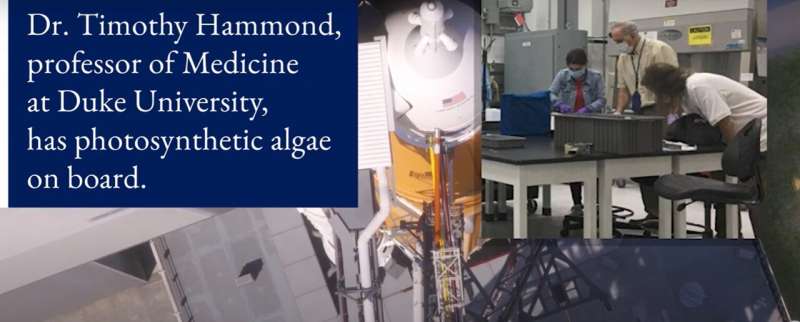
A Duke research study is preparing to blast off to the Moon with NASA on Artemis I.
Dr. Tim Hammond, professor of medicine at Duke, and co-investigator Dr. Holly Birdsall created the "Fuel to Mars" study to identify genes and gene pathways that fuel-producing algae use to survive deep space. A duplicate control experiment is housed at the Durham VA hospital to see how the algae grow without exposure to radiation and microgravity.
Their findings could help pave the way for future human space explorers.
The Artemis I, which has been delayed once already, is scheduled to blast off Saturday.
Explore further
First exoplanet image from James Webb Space Telescope revealed
Thursday, 01 September 2022 16:22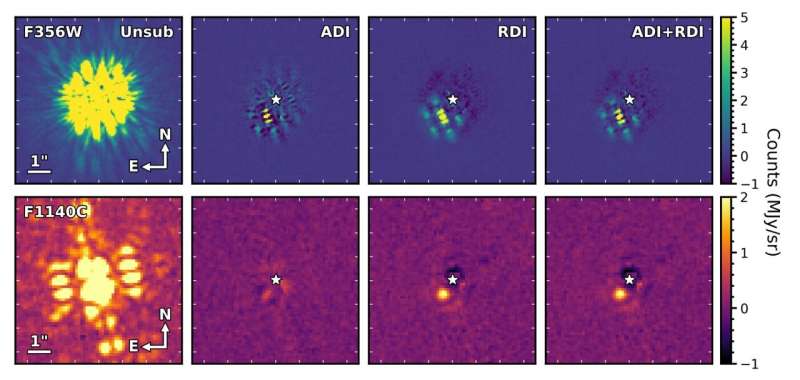
This team of amateurs built a satellite that NASA is taking to space
Thursday, 01 September 2022 16:10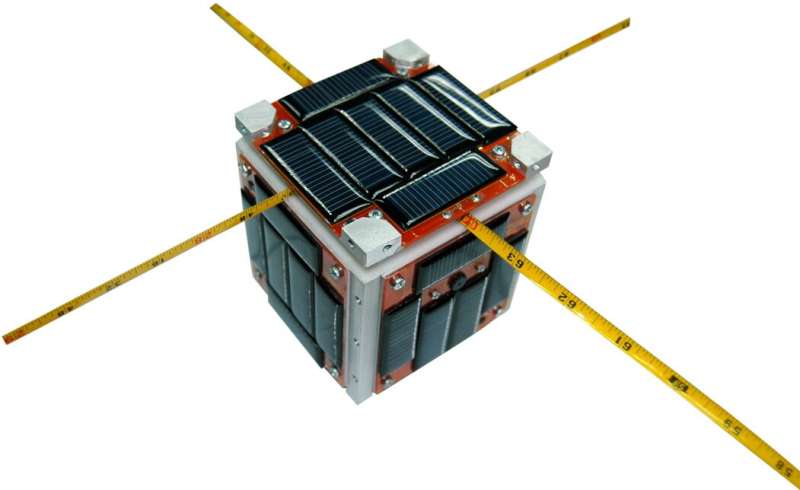
If NASA is to boldly go where no man has gone before, the federal agency might have Tampa to thank for it.
NASA is set to launch the unmanned Artemis 1, the first flight of its larger Artemis program mission to build a moon base and send astronauts to Mars.
Such accomplishments will require affordable and reliable deep space communication. That's where Tampa comes in.
A team of mostly amateurs from around the country—but based out of Tampa—built a CubeSat, which is a miniature, cubed-shaped satellite used in space exploration in recent years.
The size of two loaves of bread side by side, their solar-powered CubeSat will hitch a ride on Artemis 1, get dropped off short of the moon and then propel itself as far as 28 million miles farther. All the while, their CubeSat will transmit information back to Earth.
"It's pretty unbelievable," said Wesley Falor, head of the group known as Team Miles.
Space Force building ground station in Alaska ahead of launch of Arctic satcom mission
Thursday, 01 September 2022 16:02
The U.S. Space Force broke ground on a new site at Clear Space Force Station, Alaska, will be the main gateway to the EPS-R payloads that will launch in 2023
The post Space Force building ground station in Alaska ahead of launch of Arctic satcom mission appeared first on SpaceNews.
Startups Scout and Privateer to collaborate on space-tracking technologies
Thursday, 01 September 2022 16:00
Space startups Privateer and Scout are "looking into how we can best combine our capabilities."
The post Startups Scout and Privateer to collaborate on space-tracking technologies appeared first on SpaceNews.
We're heading to the moon and maybe Mars. So who owns them?
Thursday, 01 September 2022 15:59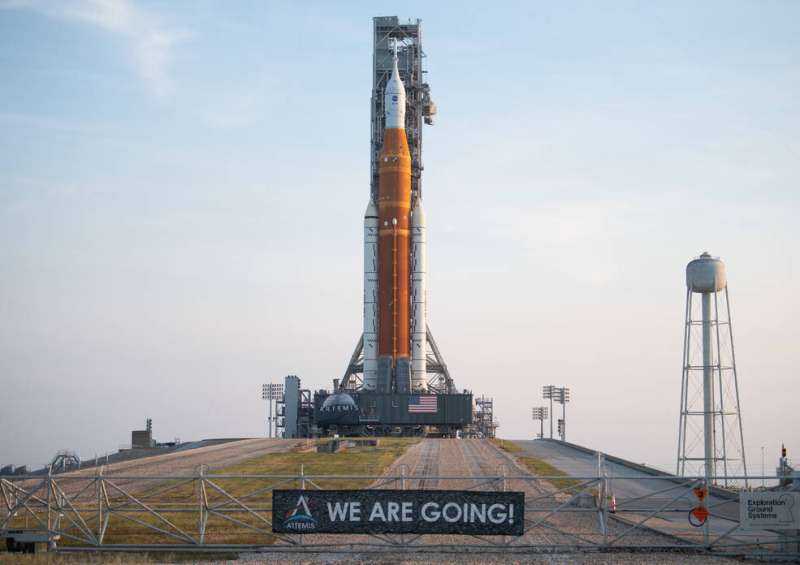
Color change in space materials may help measure degradation remotely
Thursday, 01 September 2022 15:23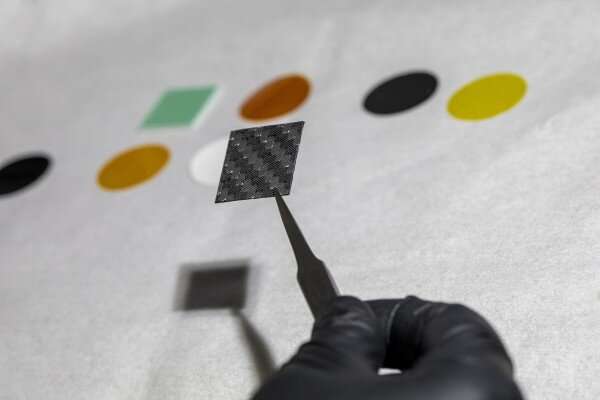
For the next six months, a camera system on the exterior of the International Space Station (ISS) will be snapping photos of more than a dozen different material samples, gathering detailed information that will help researchers determine how—and why—the harsh conditions of space affect these materials. Among the issues to be studied are color changes that may indicate the degradation caused by exposure to the environment in space.
A key goal of the research will be to correlate the color changes that occur under low-Earth orbital (LEO) exposure with variations in the materials' properties—such as structural strength, chemical composition, and electrical conductivity—to determine how these spectral changes might allow scientists and engineers to visually assess deterioration.
Startup OQ Technology raises $13 million to expand satellite IoT network
Thursday, 01 September 2022 14:45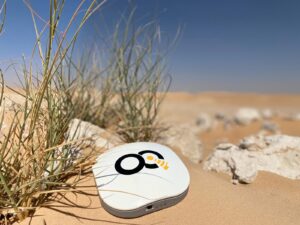
Luxembourg startup OQ Technology said Sept. 1 that it had raised about $13 million for its planned satellite constellation to connect internet of things (IoT) devices.
The post Startup OQ Technology raises $13 million to expand satellite IoT network appeared first on SpaceNews.
Game on at Gamescom
Thursday, 01 September 2022 14:45
More than 265 000 visitors headed to Cologne in Germany for Gamescom last week – the world’s largest computer and video games fair. As well as the latest games releases, they got a chance to discover that ESA and the gaming world have a lot in common.
Latest Galileo satellites join operational constellation with enhanced, faster fix
Thursday, 01 September 2022 14:35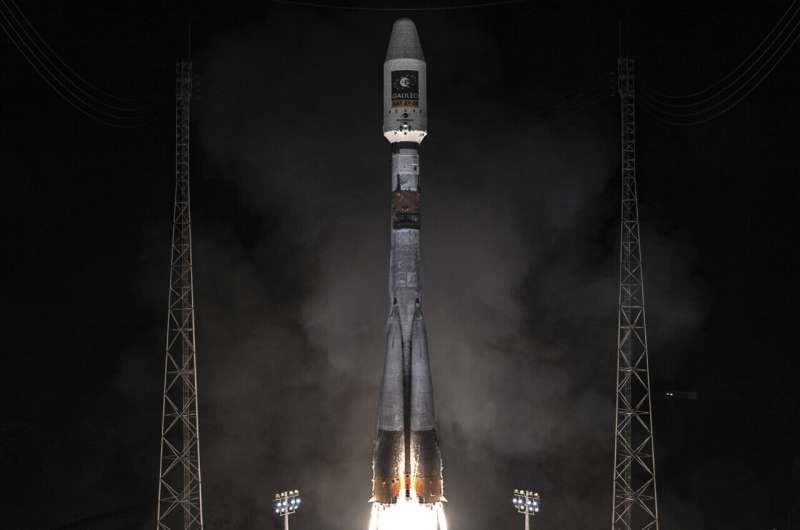
Europe's latest Galileo satellites in space have joined the operational constellation, transmitting navigation signals to three billion users across planet Earth as well as relaying distress calls to rescuers. Their entry into service follows a summer test campaign and will result in a measurable increase in positioning accuracy and improved data delivery performance of the overall Galileo system.
Galileo satellites 27–28 were launched at the end of last year and underwent their in-orbit test review at the end of April, held between ESA, satellite manufacturer OHB and navigation payload maker Surrey Satellite Technology Ltd (SSTL). Their key findings included the fact that both satellites' payloads are performing extremely well—among the best in the entire constellation—and that both satellites entering into service increase the position accuracy and robustness of the overall Galileo system.
